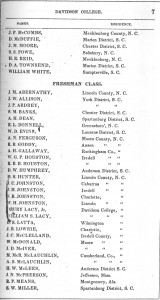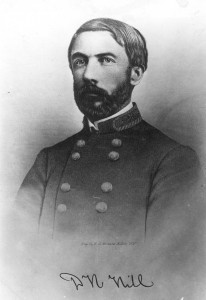Mary D. Beaty meticulously researched the history of Davidson for her book A History of Davidson College for the 150th anniversary of the college. Now as the college approaches its 175th anniversary next year, Around the D begins an ongoing series on reflecting on an event “This Day in Davidson’s History” by retelling from Beaty’s History of Davidson College:
By 1854, the rigid disciplinarian D.H. Hill had arrived at Davidson armed with a demerit system to instill a “system of responsibility” in the rebellious Davidson men. Yet the events of December 21, 1854, demonstrated cracks in Hill’s disciplined order for Davidson College.
Innocently enough, as Beaty explains, the young men of Davidson were “blowing-off pre-Christmas high spirits” by gathering in front of the chapel and celebrating in good cheer. The faculty, led by Hill, disapproved however, and all four of them “trooped up to demand that [the students] return to their rooms.” A harmless celebration turned to rioting, as the students responded by throwing rocks at the four faculty — and one hit Major Hill himself. Hill escalated the feud by drawing his sword on the rebellious students. Upon Hill’s direct threat of violence, Beaty explains that the students decided “that they were ready for bed, after all,” in an act of concession to the faculty.
Yet, the events of the December 21st rebellion did not end there! The faculty marched into the dormitories, room by room, to ensure the students were acting in a civilized manner, and they found “every student remarkably deep in study or sleep.” All except one – one room was locked, and thus the faculty thus forced their way inside with an axe. Inside, the faculty “found a freshman named Newton virtuously feigning sleep but still wearing his clothes and boots.”
The faculty did not take the events of December 21, 1854 lightly. Newton was suspended for three months on December 26 on the grounds of “strong circumstantial evidence” of his participation in the riots. The students also did not take this lightly, as 42 students signed a petition in protest of Newton’s suspension on “mere suspicion” as “inconsistent with the principles of justice and contrary to the dictates of reason.”
As the situation continued to escalate, Beaty explained that “Davidson entered upon the darkest period of its history.” The events of December 21, 1854 and the ensuing controversy led the students to collectively leave the college en masse on January 3, 1855.
 Without students, there was no college, but the faculty refused to relent! Instead the faculty, backed by the trustees, adopted a new scholarship program to encourage new students to come to Davidson to replace those who left in protest. In the end, the faculty won out – a new wave of scholarship holders replaced the old, and thus the 1855-1856 catalogue shows few upperclassmen, and 48 freshmen. In fact, only 10 of the rebellious students returned, and then only after signing a pledge “to conduct myself with propriety at all times in future.”
Without students, there was no college, but the faculty refused to relent! Instead the faculty, backed by the trustees, adopted a new scholarship program to encourage new students to come to Davidson to replace those who left in protest. In the end, the faculty won out – a new wave of scholarship holders replaced the old, and thus the 1855-1856 catalogue shows few upperclassmen, and 48 freshmen. In fact, only 10 of the rebellious students returned, and then only after signing a pledge “to conduct myself with propriety at all times in future.”
The events of December 21, 1854 are important to Davidson’s history, as they show how a little happening had a major impact on the history of the institution!


Speak Your Mind